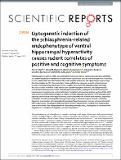Optogenetic induction of the schizophrenia-related endophenotype of ventral hippocampal hyperactivity causes rodent correlates of positive and cognitive symptoms
Author(s)
Wolff, Amy R.; Bygrave, Alexei M.; Sanderson, David J.; Boyden, Edward; Bannerman, David M.; Kullmann, Dimitri M.; Kaetzel, Dennis; ... Show more Show less
DownloadPublished version (2.806Mb)
Terms of use
Metadata
Show full item recordAbstract
Pathological over-activity of the CA1 subfield of the human anterior hippocampus has been identified as a potential predictive marker for transition from a prodromal state to overt schizophrenia. Psychosis, in turn, is associated with elevated activity in the anterior subiculum, the hippocampal output stage directly activated by CA1. Over-activity in these subfields may represent a useful endophenotype to guide translationally predictive preclinical models. To recreate this endophenotype and study its causal relation to deficits in the positive and cognitive symptom domains, we optogenetically activated excitatory neurons of the ventral hippocampus (vHPC; analogous to the human anterior hippocampus), targeting the ventral subiculum. Consistent with previous studies, we found that vHPC over-activity evokes hyperlocomotion, a rodent correlate of positive symptoms. vHPC activation also impaired performance on the spatial novelty preference (SNP) test of short-term memory, regardless of whether stimulation was applied during the encoding or retrieval stage of the task. Increasing dopamine transmission with amphetamine produced hyperlocomotion, but was not associated with SNP impairments. This suggests that short-term memory impairments resulting from hippocampal over-activity likely arise independently of a hyperdopaminergic state, a finding that is consistent with the pharmaco-resistance of cognitive symptoms in patients.
Date issued
2018-08Department
McGovern Institute for Brain Research at MIT; Massachusetts Institute of Technology. Media Laboratory; Program in Media Arts and Sciences (Massachusetts Institute of Technology)Journal
Scientific Reports
Publisher
Springer Nature
Citation
Wolff, Amy R., et al. “Optogenetic Induction of the Schizophrenia-Related Endophenotype of Ventral Hippocampal Hyperactivity Causes Rodent Correlates of Positive and Cognitive Symptoms.” Scientific Reports 8, 1 (December 2018): 12871. © 2018 The Authors
Version: Final published version
ISSN
2045-2322